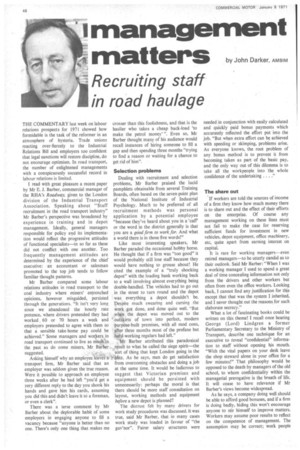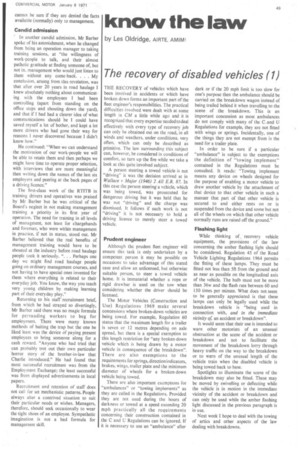management
Page 50

Page 51

If you've noticed an error in this article please click here to report it so we can fix it.
matters by John Darker, AMBIM
Recruiting staff in road haulage
THE COMMENTARY last week on labour relations prospects for 1971 showed how formidable is the task of the reformer in an atmosphere of hysteria. Trade unions reacting over-fiercely to the Industrial Relations Bill and employers too confident that legal sanctions will restore discipline, do not encourage optimism. In road transport, the number of enlightened managements with a conspicuously successful record in labour relations is limited.
I read with great pleasure a recent paper by Mr E. J. Barber, commercial manager of the RHA's Roadway, given to the London division of the Industrial Transport Association. Speaking about "Staff recruitment in the road transport industry" Mr Barber's perspective was broadened by experience in training and in depot management. Ideally, general managers responsible for policy and its implementation would reflect the progressive attitudes of functional specialists—in so far as these did not conflict with one another. Too frequently management attitudes are determined by the experience of the chief executive: an accountant or salesman promoted to the top job tends to follow familiar thought patterns.
Mr Barber compared some labour relations attitudes in road transport to the coal industry where miners' entrenched opinions, however misguided, persisted through the generations. "It isn't very long since we abandoned the hourly rate pretence, where drivers pretended they had worked 60 or 70 hours a week and employers pretended to agree with them so that a sensible take-home pay could be achieved." Some managers and workersin road transport continued to live as much:in the past as do some miners, Mr Barber suggested.
Asking himself why an employee leaves a transport firm, Mr Barber said that an employer was seldom given the true reason. Were it possible to approach an employee three weeks after he had left "you'd get a very different reply to the day you shook his hands and gave him his cards, assuming you did this and didn't leave it to a foreman, or even a clerk".
There was a terse comment by Mr Barber about the deplorable habit of some employers in engaging anyone to fill a vacancy because "anyone is better than no one. There's only one thing that makes me crosser than this foolishness, and that is the haulier who takes a cheap back-load 'to make the petrol money' ". Even so, Mr Barber thought many of his audience would recall instances of hiring someone to fill a gap and then spending three months "trying to find a reason or waiting for a chance to get rid of him".
Selection problems Dealing with recruitment and selection problems, Mr Barber praised the lucid pamphlets obtainable from several Training Boards, often based on the seven-point plan of the National Institute of Industrial Psychology. Much to be preferred of all recruitment methods was personal application by a potential employee "because they've heard about you in a 'call' or the word in the district generally is that you are a good firm to work for. And what a world there is in those five words!"
Like most interesting speakers, Mr Barber paraded the occasional hobby horse. He thought that if a firm was "too good" it would probably still lose staff because they would have nothing to grouse about! He cited the example of a "truly shocking depot" with the loading bank working back to a wall involving almost everything being double-handled. The vehicles had to go out in the street to turn round and the depot was everything a depot shouldn't be. Despite much swearing and cursing the work got done, and done quite well. "But when the depot was moved out to the outskirts of town into perfect, modern purpose-built premises, with all mod cons, after three months most of the profane but hard-working regulars had left."
'Mr Barber attributed this paradoxical ,result to what he called the siege spirit—the ,sort of thing that kept London going in the • HAtz. As he says, men do get satisfaction from overcoming obstacles and doing a job at the same time. It would be ludicrous to suggest that Victorian premises and equipment should be persisted with unnecessarily: perhaps the moral is that there should be more staff consultation on layout, working methods and equipment before a new depot is planned?
The distrust felt by many drivers for work study procedures was discussed. It was true, said Mr Barber, that in many cases work study was loaded in favour of "the guv'nor". Fairer salary structures were needed in conjunction with easily calculated and quickly paid bonus payments which accurately reflected the effort put into the job. "But when extra effort can be achieved with speeding or skimping, problems arise. As everyone knows, the root problem of any bonus method is to prevent it from becoming taken as part of the basic pay, and the only way out of this dilemma is to take all the workpeople into he whole confidence of the undertaking . . . ."
The share out
If workers are told the sources of income of a firm they know how much money there is to share out and the effect of their efforts on the enterprise. Of course any management working on these lines must not fail to make the case for reserving sufficient funds for investment in new vehicles, depot equipment, office machinery, etc, quite apart from earning interest on capital.
It is rare for working managers—even retired managers—to be utterly candid as to their outlook. Said Mr Barber: "When I was a working manager I used to spend a great deal of time concealing information not only from the drivers and other workers but often from even the office workers. Looking back, I cannot find any justification for this except that that was the system I inherited, and I never thought out the reasons for such elaborate secrecy."
What a lot of fascinating books could be written on this theme! I recall once hearing George (Lord) Lindgren a former Parliamentary Secretary to the Ministry of Transport, describe one technique for an executive to reveal "confidential" information to staff without opening his mouth. "With the vital papers on your desk leave the shop steward alone in your office for a few minutes!" That philosophy would be opposed to the death by managers of the old school, to whom confidentiality within the managerial prerogative is the breath of life. It will cease to have relevance if Mr Barber's views become widespread.
As he says, a company doing well should be able to afford good bonuses, and if a firm is doing badly, hiding this won't encourage anyone to stir himself to improve matters. Workers may assume poor results to reflect on the competence of management. The assumption may be correct; work people In another candid admission, Mr Barber spoke of his astonishment, when he changed from being an operation manager to taking training sessions, at "the willingness of work-people to talk, and their almost pathetic gratitude at finding someone of, but not in, management who would just listen to them without any come-back. . . . My conclusion, arising from this revelation, was that after over 20 years in road haulage I knew absolutely nothing about communicating with the employees I had been controlling (apart from standing on the office steps and shouting down the yard), and that if I had had a clearer idea of what communications should be I could have saved myself a lot of bother, and kept a lot more drivers who had gone their way for reasons I never discovered because I didn't know how."
He continued: "When we can understand the motivation of our work-people we will be able to retain them and then perhaps we might have time to operate proper selection, with interviews that are more meaningful then writing down the names of the last six employers and peering at the back pages of a driving licence," The first-class work of the RTITB in training drivers and operatives was praised by Mr Barber but he was critical of the Board's neglect in not making management training a priority in its first year of operation. The need for training in all levels of man agment, not least for chargehands and foreman, who were within management in practice, if not in status, stood out. Mr Barber believed that the real benefits of management training would have to be shouted at the industry before road haulage people took it seriously. ". . . Perhaps one day we might find road haulage people going on ordinary management courses, and not having to have special ones invented for them where everything is related to their everyday job. You know, the way you teach very young children by making learning part of their everyday play."
Returning to his staff recruitment brief, from which he had strayed so divertingly, Mr Barber said there was no magic formula for persuading workers to beg for employment. There were many known methods of baiting the trap but the one he liked least was the device of paying present employees to bring someone along for a cash reward. "Anyone who had tried that can probably trot out their own particular horror story of the brother-in-law that Charlie introduced." He had found that most successful recruitment was from the Employment Exchange; the least successful was from displayed advertisements in local papers.
Recruitment and retention of staff does not call for set mechanistic patterns. People always alter a contrived situation to suit their particular needs or wishes. Managers, therefore, should seek occasionally to wear the tight shoes of an employee. Sympathetic imagination is not a bad formula for management skill.












































































































































